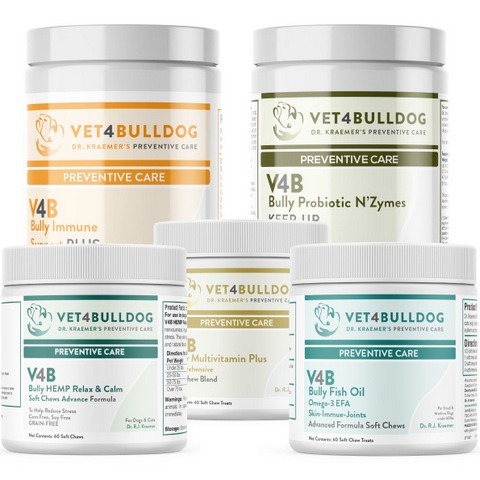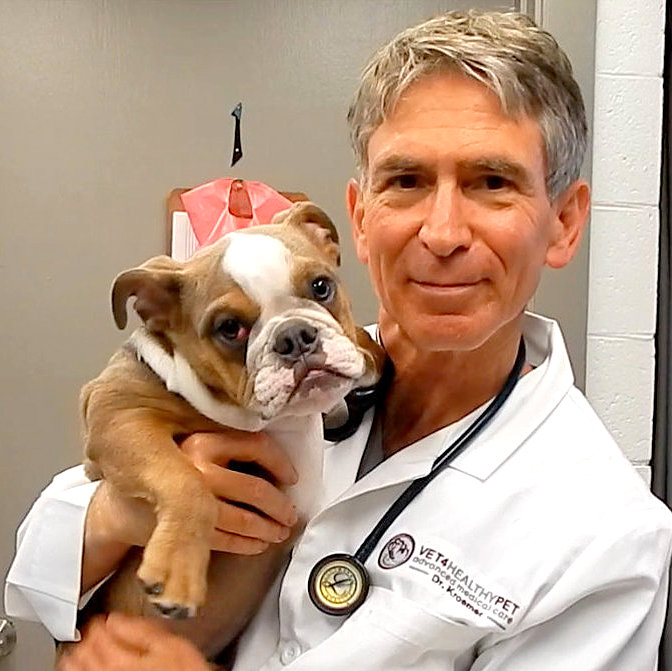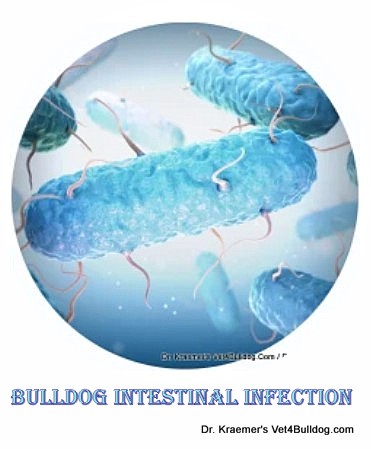Intestinal parasites, including worms and protozoa, are notably more prevalent in bulldogs and French bulldog puppies than in mature adults.
Other bulldogs who are vulnerable to endoparasites are:
- immune-suppressed bulldogs
- Immune compromised bulldogs
- bulldogs living in multi-pet households
- daycare and kennel bulldog sharing common ground
- bulldogs living on farms
- bulldogs exposed to environments infested with fleas (tapeworms)
- Bulldogs who drink from standing water that other animals defecate into

Intestinal Worms and Parasites in Bulldogs / TYPE
There are many types of intestinal parasites, among them are four common worms and two common protozoa listed below
WORMS:
1. BULLDOG ROUNDWORMS (Toxocara)
- Description: Roundworms are large, spaghetti-like worms that can be seen in the stool or vomit of infected dogs. They are particularly common in puppies.
- Transmission: Puppies often contract roundworms from their mother’s milk. The environment can also be a source of roundworm eggs.
- Prevention:
- Deworming the mother during pregnancy can reduce the risk of transmission to the puppies
- Regular deworming
- environmental cleanliness
2. BULLDOG TAPEWORMS:
- Description: Tapeworm segments resemble small, white grains of rice and may be found around the dog’s anus or in their feces. Tapeworm infection is commonly associated with flea infestations.
- Transmission: Dogs become infected with tapeworms by ingesting fleas that contain tapeworm larvae.
- Prevention:
- Effective flea control is essential in preventing tapeworm infections
- Regular deworming
3. BULLDOG HOOKWORMS (Ancylostoma)
- Description: Hookworms are small, thin worms that attach to the lining of the intestinal wall, feeding on the dog’s blood. They can cause anemia, especially in puppies.
- Transmission: Dogs can become infected through skin contact with larvae in the environment or by ingesting the larvae.
- Prevention:
- Regular deworming
- maintaining clean environments
- preventing contact with contaminated soil
4. BULLDOG WHIPWORM (Trichuris)
- Description: Whipworms are named for their whip-like shape, with a thin front end and a thicker rear end. They reside in the cecum and colon of dogs, where they can cause irritation and discomfort.
- Transmission: Infection occurs when dogs ingest whipworm eggs from the environment, often through contaminated soil.
- Prevention:
- Regular deworming
- preventing ingestion of soil or feces from contaminated environments
PROTOZOA:
1. BULLDOG GIARDIA:
- Description: Giardia is a protozoan parasite that can cause gastrointestinal illness in bulldogs, including diarrhea.
- Transmission: Giardia is typically transmitted through the ingestion of contaminated water or feces. It can also be spread through direct contact with infected animals or contaminated environments.
- Prevention:
- Providing clean water sources
- avoiding contact with contaminated environments
- practicing good hygiene, such as regularly cleaning water bowls and living areas
2. BULLDOG COCCIDIA:
- Description: Coccidia is another protozoan parasite that can cause gastrointestinal issues in dogs.
- Transmission: Dogs can become infected with coccidia by ingesting contaminated feces or soil. It can also be spread through direct contact with infected animals or contaminated environments.
- Prevention: Maintaining good hygiene practices, such as regularly cleaning living areas and removing feces, can help minimize exposure to coccidia. Providing clean water sources and avoiding overcrowded living conditions can also help prevent infections.
BULLDOG WORMS AND INTESTINAL PARASITES RULE OUT
Here are some common conditions with clinical symptoms similar to the ones manifested by our list of parasites that should be ruled out:
1. Bulldog and French Bulldog Viral Infections (e.g., Parvovirus):
Viral infections, such as parvovirus, can cause severe gastrointestinal symptoms in dogs.
A specific test for parvovirus may be performed to rule out this viral infection.
2. Intestinal bacterial infections (e.g., E. coli and Salmonella):
Bacterial infections can lead to gastrointestinal issues and may require specific testing, such as fecal culture or PCR testing, to identify the presence of pathogenic bacteria like E. coli or Salmonella.
3. Bulldog Food Allergy or Food Intolerance:
Food allergies or intolerances can lead to gastrointestinal upsets, including diarrhea and vomiting. Elimination diets or food trials may be used to identify potential food allergens or intolerances.
4. Bulldog Inflammatory Bowel Disease (IBD):
IBD is a chronic inflammatory condition of the gastrointestinal tract that can cause symptoms such as chronic diarrhea, weight loss, and vomiting. Diagnosis may involve blood tests, fecal testing, imaging studies, and sometimes intestinal biopsies.
5. Bulldog and French Bulldog Gastroenteritis:
Gastroenteritis refers to inflammation of the stomach and intestines, often resulting from infections, dietary indiscretion, or other factors. Diagnostic tests may include blood work, fecal testing, and imaging studies to rule out other underlying causes.
Intestinal Worms and Parasites in Bulldogs / PUBLIC HEALTH
Warning: Bulldog intestinal worms pose a potential threat to human health. Vulnerable populations, including children, seniors, and individuals with weakened immune systems, are particularly at risk. Transmission of zoonotic parasites typically occurs through contact with contaminated pet feces, leading to ingestion and potential infection in humans.
HUMAN-PET PARASITE PREVENTION:
To mitigate the risk of zoonotic parasite transmission and protect both pets and humans, comprehensive care and prevention measures should be implemented on multiple levels:
- Regular Veterinary Check-ups: Ensure bulldogs receive routine veterinary care, including fecal examinations and deworming treatments.
- Hygiene Practices: Practice good hygiene habits, such as frequent handwashing with soap and water, especially after handling pets, cleaning up pet waste, or participating in outdoor activities where exposure to contaminated soil may occur.
- Proper Waste Disposal: Dispose of pet feces promptly and appropriately, following local regulations and guidelines. Use disposable gloves or implements to handle waste, and avoid direct contact with feces.
- Environmental Cleaning: Regularly clean and disinfect areas where pets frequent, such as living spaces, yards, and pet bedding. This helps reduce environmental contamination with parasite eggs or cysts.
- Education and Awareness: Educate household members, particularly children, about the importance of pet hygiene and parasite prevention. Teach them to avoid behaviors that increase the risk of exposure to pet feces, such as putting hands or objects in their mouths after handling pets.
- Flea Control: Implement effective flea control measures to reduce the risk of tapeworm transmission, as fleas serve as intermediate hosts for certain tapeworm species. Use veterinarian-recommended flea preventatives and regularly inspect pets for signs of flea infestation.
- Regular De-worming: Follow a veterinarian-recommended deworming schedule for bulldogs and other pets to prevent and control intestinal parasite infections. Deworming medications prescribed by a veterinarian are effective in eliminating intestinal parasites and reducing the risk of transmission to humans.
Bulldog intestinal worms pose a potential threat to human health
Intestinal Worms and Parasites in Bulldogs / SYMPTOMS
- Weight Loss: Intestinal parasites can deprive dogs of essential nutrients, leading to weight loss despite a normal or increased appetite. In puppies, this may manifest as a failure to thrive or grow at a healthy rate.
- Pot Belly: Puppies with heavy worm infestations may develop a distended abdomen, often referred to as a “pot belly.” This occurs due to the accumulation of worms in the intestinal tract, causing bloating and swelling.
- Anorexia: Infected dogs may experience a loss of appetite or a refusal to eat. This can contribute to weight loss and further deterioration of health.
- Nausea & Vomiting: Intestinal parasites can irritate the stomach lining, leading to nausea and vomiting in affected dogs. Vomiting may contain worms or segments of worms, especially in severe cases.
- Diarrhea: Diarrhea is a common symptom of intestinal parasite infections, characterized by loose or watery stools. The presence of blood or mucus in the stool may indicate a more severe infestation or secondary complications.
- Weakness & Anemia: Chronic intestinal parasite infections can result in weakness, lethargy, and anemia (low red blood cell count) due to blood loss caused by intestinal bleeding or nutrient depletion.
Intestinal Worms and Parasites in Bulldogs / DIAGNOSIS
- EXAM
- FECAL TEST
- BLOOD TEST: CBC, Chemistries, Parvo Test
- IMAGING: Like ultrasound and radiographs
Preventing Intestinal Worms and Parasites in Bulldog
Preventative measures are the most effective and cost-efficient way to protect against parasites, associated diseases, and potential public health risks.
MONTHLY MULTIPURPOSE PARASITIC PREVENTIVES
Several multipurpose flea prevention products are available on the market, offering protection against a broad range of parasites, including fleas, ticks, intestinal worms, mites, and sometimes even heartworms. Here are some of the well-known multipurpose flea and parasite prevention products, such as
- NexGard® (afoxolaner)
- Bravecto® (fluralaner)
- Simparica® (sarolaner):
PROFOLOACTIC FECAL TESTS AND DEWORMING
Routine Fecal Testing:
- Purpose: Fecal tests help detect the presence of intestinal parasites
- Frequency: It’s recommended that pets undergo fecal testing at least once a year, but puppies, kittens, and pets with gastrointestinal symptoms may require more frequent testing.
Preventive Deworming:
- Purpose: Deworming medications are used to treat and prevent intestinal parasite infections. Preventive deworming is particularly important in young animals, which are often more susceptible to parasites.
- Schedule: Puppies and kittens typically start their deworming treatments at a few weeks of age, with several follow-up doses. After the initial series, usually annually
BULLY THERAPEUTIC SUPPLEMENTS PREVENT & TREAT
Therapeutic supplements can help reduce stress and associated immune suppression, protect the gut and associated dysbiosis
STRESS RELIEF:
- V4By Bully StressLess Formula
- V4B Bully HEMP Relax & Calm
IMMUNE BOOST:
- V4B Immune Support
- V4B Bully Multivitamin
- V4B Bully Fish Oil EFA
GI HEALTH
- V4B Bully Probiotics
- V4B Gentle Move Fiber Formula
Preventing Intestinal Worms and Parasites in Bulldog
- Dewormers
- Antibiotics
- Anti Diarrhea
- Anti Vomit
- Dietary support
- Fluid Support
- Supplementation
Recommended by Owners Approved by Bulldogs






















